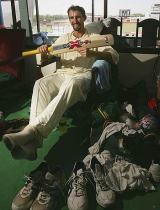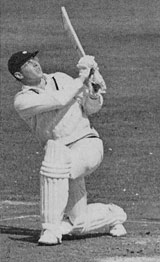The XI bolts from the blue
Batsmen in the wickets, bowlers in the runs or Boycott hitting sixes. Steve Pittard digs out tales of the unexpected
|
|

|
After Bangladesh folded for 197 in the second Test at Chittagong in 2005-06, Australia batted, lost a wicket and Gillespie, who had taken three wickets, went in as nightwatchman. After two further days, both reduced by rain, he was 102 not out. The fourth was his 31st birthday. He celebrated by reaching 201 not out, comfortably the best score by a Test nightwatchman. He had faced 425 balls, more than Chris Tavaré did in any Test innings. Gillespie's previous highest first-class score was 58.
Shepherd took 5 for 50 as the 1961 Australians were bundled out for 192, then arrived at the crease with Glamorgan at 94 for 8. No living cricketer has suffered more first-class ducks, 149, so few expected him to last long against the brilliant spinners Richie Benaud and Lindsay Kline on a Swansea dustbowl. He did not but he was famous for 15 minutes, hitting both for three sixes. With three fours too, his 51 came up in 11 scoring strokes as Glamorgan gained a respectable draw. Benaud called it "the greatest bit of sustained hitting I've seen".
Before playing at Mumbai in 2004-05 Clarke had bowled one Test over, pre-lunch in Bangalore on his debut. But with Shane Warne out and the stand-in Nathan Hauritz flagging, his left-arm spin was introduced. He removed Rahul Dravid, soon demolished the remaining batsmen and finished with figures of 6.2-0-9-6. Any notion that Australia had discovered another spinning blond bombshell were dispelled when they were shot out for 93 in 30.5 overs. Both teams condemned the pitch and Australia lost by 13 runs.
Scoring his Test runs at Boycott's pace, with footwork that made Marcus Trescothick look like Fred Astaire, Emburey seemed unlikely to help the England XI make a quick declaration against Tasmania on the 1986-87 Ashes tour. Never keen on scampering singles, he decided to hit wildly and smashed 46 in 33 minutes, scored solely in boundaries - 10 fours and a six - surpassing the previous highest first-class score made entirely of boundaries. England cruised to a victory.
|
|

|
In his previous Gillette Cup match Boycott had taken 32 overs for 23 so in the 1965 final, after Yorkshire had plodded to 22 for 1, Brian Close promoted himself, he says, to give Boycott a crash course in one-day batting. Urged to "start looking for ones" and "put some force into your shots", Boycott warmed to his task and after hitting a boundary, Close implored: "Bloody marvellous. Now hit everything." He did, making 146 with 15 fours and even three sixes. Yorkshire's 317 proved unassailable, beating Surrey by 175 runs. Naturally Boycott disputes Close's account.
Kent's Catt was not always feline behind the stumps, once conceding 48 byes in an innings, complaining of sunburn, but he was a fantastic nightwatchman. At Maidstone in 1962 he came in at 16 for 1 after Leicestershire declared on 351. The next morning he cracked 121 before lunch for his maiden ton. His 162 turned the tables and Kent, declaring at 551, won by an innings. He never scored another century and Kent presumably thought it a flash in the pan; he was back at No. 9 the following match.
After Australia had piled on 601 at Brisbane in 1954-55 in the first Test England fell to 25 for 4 on the third afternoon. The stage seemed set for Trevor Bailey to stonewall for a draw and he duly reached 38 in two hours 40 minutes. The next day he smashed Ian Johnson over long-on for the second six of his Test career before reverting to type. A local businessman offered $100 the previous evening for the first Englishman to clear the ropes. Despite Bailey's defence England lost by an innings.
In the Edgbaston Test against New Zealand in 1999 Alec Stewart was bowled for a duck in murky light. Tudor, who had a best for Surrey of 56 but had scored an undefeated 32 at No. 9 in the first innings, came out as nightwatchman, protecting his captain Nasser Hussain. Next day, after dispatching Simon Doull for four fours in five balls, he outlasted Mark Butcher and Hussain and seemed set for a century, being on 84 when joined by Graham Thorpe with 34 needed for victory. But his Surrey team-mate scored a quick 21 to level the scores with Tudor on 95. He could do no more than get to 99 not out with his 21st four. England had at last found somebody who could score runs at No. 3.
|
|

|
After taking one wicket for 242 runs in his previous 50 Tests many a captain might have mothballed his left-arm mediocre but he was in charge, brought himself on against West Indies at Sydney 1988-89 and instantly produced spitting cobras. His 7 for 46 included Viv Richards, Carl Hooper, Richie Richardson and Gus Logie. He celebrated by grinding the fifth slowest Test fifty, over five hours. He then took 4 for 50 in the second innings to become the first Australian captain to take a 10-wicket haul, as Australia won by seven wickets.
By 1969 the lively Bajan bowler had lost new-ball duties for Glamorgan and, after taking six County Championship wickets in seven matches, dropped down the pecking order. But at Colwyn Bay, after Leicestershire's first wicket had put on 84, Tony Lewis brought him on as seventh bowler. He soon dismissed both openers and sent down 24.4 overs, taking 9 for 49 - his best bowling figures. It earned him promotion to sixth bowler in the second innings but his 4 for 61 could not force the win.
Despite a County Championship career bowling average of over 100 Middlesex's occasional bowler proved harder to read than James Joyce for the Surrey batsman Mark Ramprakash at Guildford in 2003. A lifting loosener dented Ramps' helmet, prompting much joshing from his former team-mates. Using abusive language, the batsman demanded the umpires halt play, citing the drizzle as unacceptable. A sudden downpour spared him further chin music but the ECB later fined him for his invective. Umpire Mark Benson said: "What it amounts to is that he got booked for dissent."